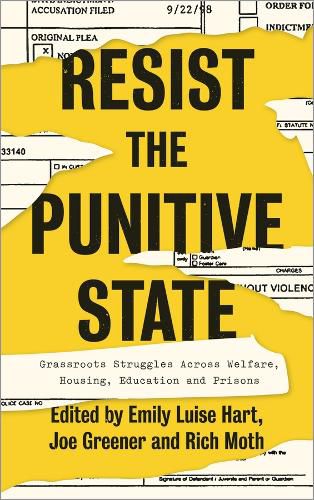Readings Newsletter
Become a Readings Member to make your shopping experience even easier.
Sign in or sign up for free!
You’re not far away from qualifying for FREE standard shipping within Australia
You’ve qualified for FREE standard shipping within Australia
The cart is loading…






To examine government policy and state practice on housing, welfare, mental health, disability, prisons or immigration is to come face-to-face with the harsh realities of the ‘punitive state’.
But state violence and corporate harm always meet with resistance. With contributions from a wide range of activists and scholars, Resist the Punitive State highlights and theorises the front line of resistance movements actively opposing the state-corporate nexus. The chapters engage with different strategies of resistance in a variety of movements and campaigns. In doing so the book considers what we can learn from involvement in grassroots struggles, and contributes to contemporary debates around the role and significance of subversive knowledge and engaged scholarship in activism.
Aimed at activists and campaigners plus students, researchers and educators in criminology, social policy, sociology, social work and the social sciences more broadly, Resist the Punitive State not only presents critiques of a range of harmful state-corporate policy agendas but situates these in the context of social movement struggles fighting for political transformation and alternative futures.
$9.00 standard shipping within Australia
FREE standard shipping within Australia for orders over $100.00
Express & International shipping calculated at checkout
Stock availability can be subject to change without notice. We recommend calling the shop or contacting our online team to check availability of low stock items. Please see our Shopping Online page for more details.
To examine government policy and state practice on housing, welfare, mental health, disability, prisons or immigration is to come face-to-face with the harsh realities of the ‘punitive state’.
But state violence and corporate harm always meet with resistance. With contributions from a wide range of activists and scholars, Resist the Punitive State highlights and theorises the front line of resistance movements actively opposing the state-corporate nexus. The chapters engage with different strategies of resistance in a variety of movements and campaigns. In doing so the book considers what we can learn from involvement in grassroots struggles, and contributes to contemporary debates around the role and significance of subversive knowledge and engaged scholarship in activism.
Aimed at activists and campaigners plus students, researchers and educators in criminology, social policy, sociology, social work and the social sciences more broadly, Resist the Punitive State not only presents critiques of a range of harmful state-corporate policy agendas but situates these in the context of social movement struggles fighting for political transformation and alternative futures.